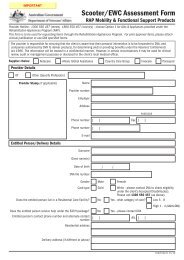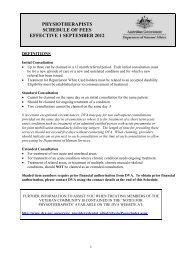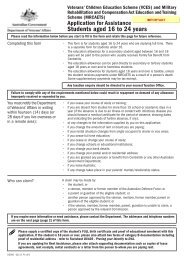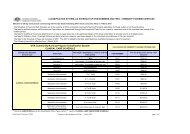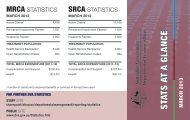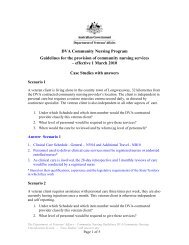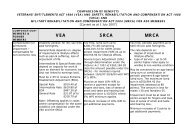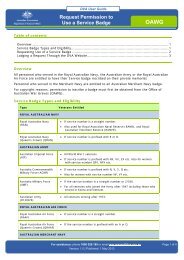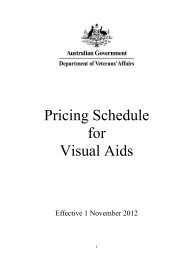Unit 5 - Fighting and surviving at Anzac - Department of Veterans ...
Unit 5 - Fighting and surviving at Anzac - Department of Veterans ...
Unit 5 - Fighting and surviving at Anzac - Department of Veterans ...
You also want an ePaper? Increase the reach of your titles
YUMPU automatically turns print PDFs into web optimized ePapers that Google loves.
<strong>Unit</strong><br />
AWM A05784<br />
Overview<br />
<strong>Fighting</strong> <strong>and</strong><br />
<strong>surviving</strong> <strong>at</strong><br />
<strong>Anzac</strong><br />
Focus question DVD-VIDEO connections DVD-ROM interactives connection<br />
1 Wh<strong>at</strong> was life like for the<br />
soldiers <strong>at</strong> Gallipoli?<br />
Revealing Gallipoli<br />
15:16-20:12<br />
(Part 2 Chapter 5)<br />
Australians <strong>at</strong> War<br />
Episode 2<br />
‘Who’ll come a fighting the Kaiser with me’<br />
26:20-30:55<br />
(Chapter 6)<br />
The story <strong>of</strong> Priv<strong>at</strong>e Jim Martin<br />
Who were the nurses in the Gallipoli<br />
campaign?<br />
The Gallipoli Times<br />
When we commemor<strong>at</strong>e <strong>Anzac</strong> Day it may be th<strong>at</strong> almost all the emphasis is on the events <strong>of</strong><br />
one day, 25 April 1915. However, the campaign on the Gallipoli peninsula lasted for 260 days.<br />
Wh<strong>at</strong> happened on those other days? You may have already completed <strong>Unit</strong> 4, where some <strong>of</strong> the<br />
significant b<strong>at</strong>tles th<strong>at</strong> occurred during this time are explored. But wh<strong>at</strong> happened during the times<br />
when no significant fighting took place? In this unit you will investig<strong>at</strong>e wh<strong>at</strong> ‘normal’ life was like<br />
on Gallipoli for the <strong>Anzac</strong>s.<br />
63
When you are looking <strong>at</strong> an historical photograph there are two<br />
important questions to ask:<br />
1 Wh<strong>at</strong> does it show? Describe wh<strong>at</strong> you see — the facts.<br />
2 Wh<strong>at</strong> does it mean? Wh<strong>at</strong> are these facts telling you; their<br />
message or meaning?<br />
64<br />
<strong>Unit</strong> 5<br />
Focus question<br />
Wh<strong>at</strong> was life like<br />
for the soldiers<br />
<strong>at</strong> Gallipoli?<br />
Discuss this photograph with your classm<strong>at</strong>es, <strong>and</strong> answer the<br />
two questions.<br />
Pages 66-68 provide a way you can summarise inform<strong>at</strong>ion about<br />
wh<strong>at</strong> life was like <strong>at</strong> <strong>Anzac</strong>, but before you look <strong>at</strong> this table, look <strong>at</strong><br />
the next page for more discussion <strong>of</strong> the photograph below.<br />
AWM H00267
In answering ‘Wh<strong>at</strong> does it show?’<br />
for the photograph on page 64, you<br />
probably included such things as:<br />
it shows three men;<br />
one has a pipe in his mouth;<br />
they are wearing bits <strong>of</strong><br />
uniform;<br />
the sun is shining;<br />
there is a cross in the<br />
foreground, there seems to<br />
be washing hanging in the<br />
background<br />
— <strong>and</strong> so on.<br />
For ‘Wh<strong>at</strong> does it mean?’ you may<br />
have decided th<strong>at</strong>:<br />
it is hot (probably summer);<br />
the men are resting r<strong>at</strong>her than<br />
fighting;<br />
perhaps they have something<br />
to do with g<strong>at</strong>hering or burying<br />
the dead;<br />
there was no emphasis on<br />
uniform <strong>at</strong> Gallipoli;<br />
the men are typical fit, healthy<br />
diggers;<br />
they are in a rear part <strong>of</strong> the<br />
b<strong>at</strong>tlefield where there is no<br />
danger<br />
— <strong>and</strong> so on.<br />
You have used your observ<strong>at</strong>ions to<br />
cre<strong>at</strong>e interpret<strong>at</strong>ions.<br />
The photograph tells you a lot, but there is also a lot th<strong>at</strong> it does<br />
not tell you. Imagine th<strong>at</strong> you could talk to these three men. Wh<strong>at</strong><br />
would you now like to know about them? Your questions might be<br />
about the n<strong>at</strong>ure <strong>of</strong> the fighting, or how they felt about wh<strong>at</strong> they<br />
were doing, wh<strong>at</strong> their <strong>at</strong>titude was to the enemy, wh<strong>at</strong> the food was<br />
like, <strong>and</strong> so on.<br />
1.1 List some questions th<strong>at</strong> you would ask them about their life<br />
<strong>and</strong> experiences on Gallipoli.<br />
How can you find out the answers to the questions?<br />
To answer the questions th<strong>at</strong> this photograph has raised you need<br />
to look <strong>at</strong> evidence, <strong>and</strong> you need to interpret it.<br />
The following Resource Pages contain a variety <strong>of</strong> evidence:<br />
written accounts in soldiers’ diaries <strong>and</strong> letters;<br />
photographs;<br />
OBSERVATIONS<br />
Washing<br />
on the line<br />
3 men<br />
INTERpRETATIONS<br />
The men are<br />
resting not<br />
fighting<br />
drawings <strong>and</strong> paintings, some from the time, <strong>and</strong> others made<br />
after the events; <strong>and</strong><br />
accounts <strong>of</strong> participants’ experiences recorded well after the<br />
events.<br />
They seem<br />
fit <strong>and</strong><br />
healthy<br />
One has a pipe Their uniforms look<br />
old <strong>and</strong> informal<br />
It is hot,<br />
probably<br />
summer<br />
Uniform was not<br />
important <strong>at</strong><br />
Gallipoli<br />
For each piece <strong>of</strong> evidence you need to decide:<br />
Wh<strong>at</strong> it shows or says (the facts).<br />
<strong>Unit</strong><br />
They are in a<br />
safe place<br />
Their job may<br />
have something<br />
to do with burying<br />
the dead<br />
Wh<strong>at</strong> it means (interpreting the facts to underst<strong>and</strong> the<br />
messages or meanings).<br />
The table on pages 66-68, Soldiers’ Life on <strong>Anzac</strong>, lists a number<br />
<strong>of</strong> aspects <strong>of</strong> daily life on <strong>Anzac</strong>, <strong>and</strong> includes questions th<strong>at</strong> will<br />
help you explore those aspects for the soldiers <strong>and</strong> nurses involved<br />
— Australian, New Zeal<strong>and</strong> <strong>and</strong> Turkish. The Resource pages<br />
following it provide a variety <strong>of</strong> evidence to help you answer those<br />
questions.<br />
This task can best be done by groups cooper<strong>at</strong>ing to divide<br />
<strong>and</strong> share the inform<strong>at</strong>ion. Each group in your class should be<br />
responsible for reading one or more <strong>of</strong> the Resource pages <strong>of</strong><br />
evidence, discussing wh<strong>at</strong> the evidence tells you, deciding which <strong>of</strong><br />
the questions in the table the Resource page helps you to answer,<br />
<strong>and</strong> reporting on th<strong>at</strong> to the whole class. In this way all members <strong>of</strong><br />
the class can complete their own copy <strong>of</strong> the table without having<br />
to read all the evidence pages.<br />
65
The Soldiers’ Life on <strong>Anzac</strong><br />
66<br />
<strong>Unit</strong><br />
Focus<br />
question<br />
Aspect <strong>of</strong> life on Gallipoli Questions Notes Answer<br />
Animals Wh<strong>at</strong> animals were there?<br />
Wh<strong>at</strong> were their roles?<br />
‘Boy’ soldiers Were there ‘boy soldiers’ <strong>at</strong><br />
Gallipoli? If so, how could<br />
they have been allowed to<br />
be part <strong>of</strong> the war?<br />
Clim<strong>at</strong>e <strong>and</strong> we<strong>at</strong>her Wh<strong>at</strong> were the clim<strong>at</strong>e<br />
<strong>and</strong> we<strong>at</strong>her like?<br />
How did they affect the<br />
soldiers’ experience?<br />
Dug outs Wh<strong>at</strong> was shelter like for<br />
the soldiers <strong>at</strong> <strong>Anzac</strong>?<br />
F<strong>at</strong>igues Wh<strong>at</strong> was involved in<br />
f<strong>at</strong>igue or work parties?<br />
<strong>Fighting</strong> Wh<strong>at</strong> was the fighting like<br />
<strong>at</strong> <strong>Anzac</strong>?<br />
Food Wh<strong>at</strong> food was available to<br />
the soldiers? Wh<strong>at</strong> variety,<br />
<strong>and</strong> how nutritious?<br />
Wh<strong>at</strong> was life like for the soldiers <strong>at</strong> Gallipoli?
Aspect <strong>of</strong> life on Gallipoli Questions Notes Answer<br />
Health, hygiene <strong>and</strong><br />
disease<br />
Were the conditions<br />
hygienic? Did this affect<br />
the soldiers’ health?<br />
Medical tre<strong>at</strong>ment Wh<strong>at</strong> was the medical<br />
support like for the<br />
wounded <strong>and</strong> ill?<br />
Nurses Wh<strong>at</strong> was life like for the<br />
nurses on the hospital<br />
ships <strong>and</strong> the hospitals<br />
<strong>at</strong> Lemnos?<br />
Other n<strong>at</strong>ions Who else other than<br />
Australians, New<br />
Zeal<strong>and</strong>ers <strong>and</strong> Turks were<br />
<strong>at</strong> <strong>Anzac</strong>?<br />
Religion Wh<strong>at</strong> was the role <strong>of</strong><br />
religious leaders on<br />
Gallipoli? How did men<br />
observe their religion?<br />
Resting How did soldiers rest<br />
<strong>at</strong> <strong>Anzac</strong>?<br />
Snipers Wh<strong>at</strong> was the role <strong>of</strong><br />
snipers on both sides?<br />
How did soldiers react<br />
to them?<br />
Soldiers’ <strong>at</strong>titudes to<br />
the enemy<br />
Wh<strong>at</strong> was the <strong>at</strong>titude to<br />
the enemy?<br />
<strong>Unit</strong><br />
67
68<br />
<strong>Unit</strong><br />
Wh<strong>at</strong> was life like for the soldiers <strong>at</strong> Gallipoli?<br />
Aspect <strong>of</strong> life on Gallipoli Questions Notes Answer<br />
Soldiers’ <strong>at</strong>titudes<br />
<strong>and</strong> responses to the<br />
situ<strong>at</strong>ion on <strong>Anzac</strong><br />
Focus<br />
question<br />
How did soldiers feel<br />
about the experience?<br />
Stretcher bearers Wh<strong>at</strong> was the role <strong>of</strong><br />
the stretcher bearers?<br />
How dangerous was it?<br />
Supplies Wh<strong>at</strong> supplies were<br />
available to the soldiers?<br />
How did the soldiers get<br />
their supplies?<br />
The Turkish soldiers Wh<strong>at</strong> were the Turkish<br />
soldiers like?<br />
Trenches Wh<strong>at</strong> were conditions like<br />
in the trenches?<br />
W<strong>at</strong>er How was w<strong>at</strong>er supplied to<br />
the soldiers?<br />
Weapons Wh<strong>at</strong> were the main<br />
weapons available <strong>at</strong><br />
<strong>Anzac</strong>?
Resource Page 1<br />
For each <strong>of</strong> these sources:<br />
1 Which headings <strong>and</strong> questions in the table on pages 66–68 does it apply to?<br />
2 Write brief notes in the table about wh<strong>at</strong> it tells you about th<strong>at</strong> aspect <strong>of</strong> life on <strong>Anzac</strong>, then summarise to answer the question.<br />
Source 1.1 Corporal JB Bell<br />
I killed my first Turk on S<strong>at</strong>urday. I was firing <strong>at</strong> a s<strong>and</strong>bag in the Turkish<br />
parapet … <strong>and</strong>, to my surprise, I saw a man jump in the air <strong>and</strong> fall.<br />
It was just this Turk’s bad luck … Anyway, this is wh<strong>at</strong> I am here for.<br />
Bill Gammage, The Broken Years: Australian Soldiers in the Gre<strong>at</strong> War, Melbourne University Press,<br />
2010, page 116<br />
Source 1.2 Trooper IL Idriess<br />
[I]mmedi<strong>at</strong>ely I opened…[my tin <strong>of</strong> jam] the flies rushed [it] …all<br />
fighting amongst themselves. I wrapped my overco<strong>at</strong> over the tin <strong>and</strong><br />
gouged out the flies, spread the biscuit, held my h<strong>and</strong> over it <strong>and</strong> drew<br />
the biscuit out <strong>of</strong> the co<strong>at</strong>. But a lot <strong>of</strong> flies flew into my mouth <strong>and</strong> be<strong>at</strong><br />
about inside…I nearly howled with rage…Of all the bastards <strong>of</strong> places<br />
this is the gre<strong>at</strong>est bastard in the world.<br />
Bill Gammage, page 88<br />
Source 1.3 An Indian mule h<strong>and</strong>ler <strong>at</strong> Gallipoli<br />
Source 1.4 Priv<strong>at</strong>e ECN Devlin<br />
They are lucky who get away from here wounded…It is quite common<br />
for men to go mad here. The strain on the nerves is so severe.<br />
Bill Gammage, page 87<br />
AWM P00229.004<br />
Source 1.6 Priv<strong>at</strong>e ECN Devlin<br />
Source 1.5 A soldier’s sketch <strong>at</strong> Gallipoli titled ‘Winter’<br />
We had our swim during the afternoon <strong>and</strong> how we did enjoy it. It is a r<strong>at</strong>her<br />
weird experience swimming with the shrapnel bursting all around one, <strong>and</strong><br />
yet one would r<strong>at</strong>her do th<strong>at</strong> than go without the only means <strong>of</strong> getting a wash.<br />
Christopher Pugsley, Gallipoli. The New Zeal<strong>and</strong> Story, Raupo (Penguin), Auckl<strong>and</strong>, 2008, page 260<br />
Source 1.7 Sergeant AL de Vine<br />
[T]he time [during the May truce to collect <strong>and</strong> bury the dead] was taken up by<br />
making friends with the Turks, who do not seem to be a very bad sort <strong>of</strong> chap<br />
after all … After today most <strong>of</strong> our opinions on the Turks were changed …<br />
Bill Gammage, page 103<br />
Source 1.8 Priv<strong>at</strong>e T Usher<br />
<strong>Unit</strong><br />
You can’t imagine wh<strong>at</strong> it was like, the filthy conditions, <strong>and</strong><br />
especially using those l<strong>at</strong>rines with all those paper (for cleaning)<br />
blowing all over the shop. And flies! Look, you’d open the tin <strong>and</strong><br />
there’d be millions <strong>of</strong> them, crikey, filthy, filthy conditions ….<br />
Harvey Broadbent, The Boys Who Came Home, ABC, Penguin, Melbourne, 2009, page 198<br />
NC Wimbush, ‘Gawd help the first flamin’ Turk I see to-night!’, 1915, pen <strong>and</strong> ink on paper, 24 x 11.9 cm, AWM ART00033<br />
69
For each <strong>of</strong> these sources:<br />
1 Which headings <strong>and</strong> questions in the table on<br />
pages 66–68 does it apply to?<br />
2 Write brief notes in the table about wh<strong>at</strong> it tells<br />
you about th<strong>at</strong> aspect <strong>of</strong> life on <strong>Anzac</strong>, then<br />
summarise to answer the question.<br />
70<br />
<strong>Unit</strong><br />
Source 2.1 Lance Corporal W Francis<br />
… up the hill … we swarm … the lust to kill is on<br />
us, we see red. Into one trench, out <strong>of</strong> it, <strong>and</strong> into<br />
another. Oh! The bloody gorgeousness <strong>of</strong> feeling<br />
your bayonet go into s<strong>of</strong>t yielding flesh – they run,<br />
we after them, no thrust one <strong>and</strong> parry, in goes the<br />
bayonet the h<strong>and</strong>iest way.<br />
Bill Gammage, The Broken Years: Australian Soldiers in the Gre<strong>at</strong> War,<br />
Melbourne University Press, 2010, page 109<br />
Source 2.2 Captain F Coen<br />
I have not had a wash now for 4 weeks, nor had my<br />
clothes <strong>of</strong>f. I accomplish my toilet with the corner <strong>of</strong><br />
a towel steeped in a 2 ounce tobacco tin. W<strong>at</strong>er for<br />
washing purposes is out <strong>of</strong> the question.<br />
Bill Gammage, page 88<br />
Source 2.3 Lieutenant Gordon Harper<br />
We went to Communion (everyone who is there<br />
does) <strong>and</strong> sang hymns. Some <strong>of</strong> the Maoris were<br />
there too <strong>and</strong> sang with gre<strong>at</strong> vigour <strong>and</strong> said their<br />
prayers aloud in Maori, while a little way <strong>of</strong>f some<br />
pious Indians, Mohammedans, were fl<strong>at</strong>tening<br />
themselves out towards the sun <strong>and</strong> invoking the<br />
same ‘Allah’ as the Turks.<br />
Christopher Pugsley, Gallipoli. The New Zeal<strong>and</strong> Story,<br />
Raupo (Penguin), Auckl<strong>and</strong>, 2008, page 258<br />
Focus<br />
question<br />
Source 2.4 Dogs in harness to transport a British machine gun<br />
Wh<strong>at</strong> was life like for the soldiers <strong>at</strong> Gallipoli?<br />
Source 2.5 W<strong>at</strong>er detail<br />
Source 2.6 Captain Mehmet Hilmi Sanlitop<br />
No one will bother with dead <strong>and</strong> the wounded. If I die walk over me <strong>and</strong> just pass.<br />
And if I get wounded, pay no <strong>at</strong>tention. I will do the same with you. Those who will<br />
replace the wounded <strong>and</strong> the dead have been determined. Don’t expect any rewards<br />
in war.<br />
Tolga Örnek <strong>and</strong> Feza Toker, Gallipoli. The Front Line Experience, Currency Press, Strawberry Hills, 2005, page 7<br />
Source 2.7 Priv<strong>at</strong>e John Gammage<br />
The wounded bodies <strong>of</strong> both Turks <strong>and</strong> our own … were piled up 3 <strong>and</strong> 4 deep …<br />
the bombs simply poured in but as fast as our men went down another would take<br />
his place. Besides our own wounded the Turks’ wounded lying in our trench were cut<br />
to pieces with their own bombs. We had no time to think <strong>of</strong> our wounded … their<br />
pleas for mercy were not heeded … Some poor fellows lay for 30 hours waiting for<br />
help <strong>and</strong> many died still waiting.<br />
Les Carlyon, Gallipoli, Macmillan, Sydney, 2001, page 360<br />
AWM P02906.002<br />
Resource Page 2<br />
Source 2.8 CEW Bean, War correspondent <strong>and</strong><br />
Official War Historian<br />
A single Turk jumped up like a rabbit, threw away his rifle<br />
<strong>and</strong> tried to escape. The nearest man could not fire as his<br />
rifle was full <strong>of</strong> s<strong>and</strong>. He bayoneted the Turk through his<br />
haversack <strong>and</strong> captured him. ‘Prisoner here!’ he shouted.<br />
‘Shoot the bastard!’ was all the notice they received<br />
from others passing up the hill. But as in every b<strong>at</strong>tle he<br />
fought in the Australian soldier was more humane than<br />
in his words. The Turk was sent down to the beach in<br />
charge <strong>of</strong> a wounded man.<br />
The Story <strong>of</strong> <strong>Anzac</strong>, Australian War Memorial, Canberra, 1941, pages 258–9<br />
Source 2.9 Colonel AG Butler, Official Medical<br />
Historian<br />
Men who were just skin <strong>and</strong> bone; h<strong>and</strong>s, arms <strong>and</strong> legs<br />
covered with septic sores; ill with dysentery; had to work<br />
in the trenches on bully-beef, bacon <strong>and</strong> biscuits.<br />
The Australian Army Medical Services in the War <strong>of</strong> 1914-1918, Vol 1,<br />
‘The Gallipoli Campaign’, Angus & Robertson, Melbourne, 1930, page 352<br />
AWM A01818
Resource Page 3<br />
For each <strong>of</strong> these sources:<br />
1 Which headings <strong>and</strong> questions in the table on<br />
pages 66–68 does it apply to?<br />
2 Write brief notes in the table about wh<strong>at</strong> it tells you<br />
about th<strong>at</strong> aspect <strong>of</strong> life on <strong>Anzac</strong>, then summarise<br />
to answer the question.<br />
Source 3.1 CEW Bean, War correspondent<br />
<strong>and</strong> Official War Historian<br />
Stretcher-bearers are always exposed to … fire in the<br />
ordinary course <strong>of</strong> carrying out their … duty, as is<br />
everyone else. … Wherever there is a wounded man<br />
to be got, there the stretcher-bearers have gone.<br />
Official desp<strong>at</strong>ch, Commonwealth <strong>of</strong> Australia Gazette, No 79, 26 July 1915,<br />
page1635<br />
Source 3.2 A British Major in the Indian Mule<br />
Corps <strong>at</strong> Gallipoli<br />
The Turks opened with shrapnel … right into the<br />
middle <strong>of</strong> the mule camp. Everybody went to ground<br />
as far as possible, but cover was inadequ<strong>at</strong>e, <strong>and</strong><br />
men <strong>and</strong> animals began to fall … the fire was deadly<br />
accur<strong>at</strong>e, <strong>and</strong> before the safety could be reached<br />
eighty-nine mules <strong>and</strong> two horses had been hit<br />
… <strong>and</strong> … Indians <strong>and</strong> several Australians were<br />
casualties. Many mules were killed outright, <strong>and</strong><br />
many others lay where they had fallen, unable to rise:<br />
those had to be shot, <strong>and</strong> th<strong>at</strong> evening the beach was<br />
strewn with dead animals – a pitiful sight.<br />
H M Alex<strong>and</strong>er, On Two Fronts, London, 1917, pages 170-171<br />
Source 3.3 2nd Lieutenant CW Saunders<br />
[A friend] came back from Lemnos <strong>and</strong> brought me<br />
a dozen eggs <strong>and</strong> [we] settled them <strong>at</strong> one gulp —<br />
it was gre<strong>at</strong>. The naval men get eggs <strong>and</strong> condensed<br />
milk from Imbros <strong>and</strong> [sell] it on the beaches<br />
[<strong>at</strong> infl<strong>at</strong>ed prices] … so they make money.<br />
Christopher Pugsley, Gallipoli. The New Zeal<strong>and</strong> Story, Raupo (Penguin),<br />
Auckl<strong>and</strong>, 2008, page 256<br />
Source 3.4 A trench after an <strong>at</strong>tack<br />
AWM A04029<br />
Source 3.6 CEW Bean, War correspondent <strong>and</strong> Official War Historian<br />
You must not imagine th<strong>at</strong> life in one <strong>of</strong> these year-long modern b<strong>at</strong>tles consists<br />
<strong>of</strong> continuous bomb fighting, bayoneting <strong>and</strong> bombarding all the time … [the]<br />
chief occup<strong>at</strong>ion is the digging <strong>of</strong> mile upon mile <strong>of</strong> endless sap [trench], <strong>of</strong><br />
sunken road … The carrying <strong>of</strong> biscuit boxes <strong>and</strong> building timbers for hours<br />
daily … the sweeping <strong>and</strong> disinfecting <strong>of</strong> trenches in the never ending b<strong>at</strong>tle<br />
against flies – this is the soldier’s life for nine days out <strong>of</strong> ten in a modern b<strong>at</strong>tle.<br />
Disp<strong>at</strong>ch, Commonwealth <strong>of</strong> Australia Gazette, 2 December 1915, page 3058<br />
Source 3.7 Trooper IL Idriess<br />
… This is the most infernally uncomfortable line <strong>of</strong> trenches we have ever<br />
been in … We are … “resting”, about fifty yards back <strong>of</strong> the firing-trench. For<br />
a couple <strong>of</strong> hours, to rest our nerves, they say. There forty-eight <strong>of</strong> us in this<br />
particular spot, just an eighteen-inch-wide trench with iron overhead supports<br />
s<strong>and</strong>bagged as protection against bombs. We are supposed to be “sleeping”,<br />
prepar<strong>at</strong>ory to our next w<strong>at</strong>ch. Sleeping! Hell <strong>and</strong> tommy! Maggots are crawling<br />
down the trench; it stinks like an unburied graveyard; it is dark; the air is<br />
stagnant; some <strong>of</strong> the new h<strong>and</strong>s are violently sick from w<strong>at</strong>ching us trying to<br />
e<strong>at</strong>. We are so crowded th<strong>at</strong> I can hardly write in the diary even … Bombs are<br />
crashing outside … The ro<strong>of</strong> <strong>of</strong> this dashed possy is intermixed with dead men<br />
who were chucked up on the parapet to give the living a chance from the bullets<br />
while the trench was being dug. Wh<strong>at</strong> ho, for the Glories <strong>of</strong> War.<br />
Ion Idriess, The Desert Column, Angus & Robertson, Sydney, 1982, page 42<br />
Source 3.8 Lieutenant Norman King Wilson<br />
<strong>Unit</strong><br />
We knew a gre<strong>at</strong> fight was going on...yet it was a shock to me when four<br />
lighters pulled up alongside <strong>and</strong> we saw the poor sh<strong>at</strong>tered figures, with bloody<br />
b<strong>and</strong>ages, grimy faces <strong>and</strong> dirty clothes who were crowded together below<br />
us...men were dying every minute, <strong>and</strong> one (medical <strong>of</strong>ficer) was utterly lost<br />
amongst the multitude needing his care.’ (The ship was badly over crowded)<br />
but lighters kept coming alongside with their burden <strong>of</strong> suffering humanity<br />
<strong>and</strong> th<strong>at</strong> man in charge would shout – ‘For God’s sake take this lot on, we’ve<br />
been going about from ship to ship <strong>and</strong> no one will have us, <strong>and</strong> more men<br />
are dying.’ We worked, one <strong>and</strong> all, until we could no longer tell wh<strong>at</strong> we were<br />
seeing or doing, all day <strong>and</strong> all night, picking out the cases where the dreaded<br />
gangrene had set in, <strong>and</strong> where immedi<strong>at</strong>e <strong>and</strong> high amput<strong>at</strong>ion was the only<br />
hope <strong>of</strong> saving life. Even the clean open decks stank with the horrid smell <strong>of</strong><br />
gangrenous flesh...The oper<strong>at</strong>ing room... was a stinking, bloody shambles<br />
(where amput<strong>at</strong>ions were carried out in a couple <strong>of</strong> minutes), the limb thrown<br />
into a basket with many others, awaiting inciner<strong>at</strong>ion – (so producing another)<br />
poor victim, a maimed testimonial to his life’s end <strong>of</strong> the brutality <strong>and</strong> savagery<br />
<strong>of</strong> war...The whole voyage was a nightmare.<br />
John Robertson, <strong>Anzac</strong> <strong>and</strong> Empire, Hamlyn Australia, Melbourne, 1990, page 206<br />
Turkish prisoners<br />
AWM J02442 Source 3.5<br />
71
For each <strong>of</strong> these sources:<br />
1 Which headings <strong>and</strong> questions in the table on pages 66–68 does it apply to?<br />
2 Write brief notes in the table about wh<strong>at</strong> it tells you about th<strong>at</strong> aspect <strong>of</strong> life<br />
on <strong>Anzac</strong>, then summarise to answer the question.<br />
72<br />
<strong>Unit</strong><br />
Source 4.1 Mules carrying supplies<br />
Source 4.3 Stretcher bearers<br />
AWM A05784<br />
Source 4.5 Priv<strong>at</strong>e James Charles (Jim) Martin<br />
He is thought to be the youngest Australian to have died on active service.<br />
He was born in the Melbourne suburb <strong>of</strong> Hawthorn, on 3 January 1901 <strong>and</strong>, having just<br />
left school to work as a farmh<strong>and</strong>, enlisted in the Australian Imperial Force (AIF) in April<br />
1915 <strong>at</strong> the age <strong>of</strong> 14 years <strong>and</strong> 3 months. He told the recruiting <strong>of</strong>ficers th<strong>at</strong> he was 18.<br />
In l<strong>at</strong>e August, he embarked for Gallipoli on the steamer HMT Southl<strong>and</strong>,’ to have our<br />
share <strong>of</strong> the Turks’, he wrote. When the ship was torpedoed by a German submarine <strong>of</strong>f<br />
Lemnos Isl<strong>and</strong>, he spent four hours in the w<strong>at</strong>er before being rescued.<br />
Priv<strong>at</strong>e Martin l<strong>and</strong>ed with his b<strong>at</strong>talion on Gallipoli on 8 September 1915 … He wrote<br />
to his family th<strong>at</strong> the “Turks are still about 70 yards away from us” <strong>and</strong> asked them not to<br />
worry about him as “I am doing splendid over here”. But on 25 October he was evacu<strong>at</strong>ed<br />
to the hospital ship Glenart Castle suffering from typhoid fever caught in the trenches. He<br />
died <strong>of</strong> heart failure th<strong>at</strong> evening. He was buried <strong>at</strong> sea … Over twenty other Australians<br />
under the age <strong>of</strong> 18 died in the First World War.<br />
www.awm.gov.au/encyclopedia/boysoldiers.asp<br />
Focus<br />
question<br />
Wh<strong>at</strong> was life like for the soldiers <strong>at</strong> Gallipoli?<br />
AWM P02282.024<br />
Source 4.4 CEW Bean, War correspondent <strong>and</strong> Official War Historian<br />
But one by one the men who were c<strong>at</strong>ching bombs were mutil<strong>at</strong>ed. Wright<br />
clutched one which burst in his face <strong>and</strong> killed him. Webb … continued to c<strong>at</strong>ch<br />
them, but presently both his h<strong>and</strong>s were blown away … At one moment several<br />
bombs burst simultaneously in Tubb’s recess. Four men were killed or wounded;<br />
a fifth was blown down <strong>and</strong> his rifle sh<strong>at</strong>tered. Tubb, bleeding from bombwounds<br />
in arm <strong>and</strong> scalp, continued to fight, supported in the end only by …<br />
Corporal Dunstan, <strong>and</strong> … Corporal Burton … At this stage there occurred <strong>at</strong> the<br />
barricade a violent explosion, which threw back the defenders <strong>and</strong> tumbled down<br />
the s<strong>and</strong>bags … Tubb, however, drove them <strong>of</strong>f, <strong>and</strong> Dunstan <strong>and</strong> Burton were<br />
helping to rebuild the barrier when a bomb fell between them, killing Burton <strong>and</strong><br />
temporarily blinding his comrade. Tubb obtained further men from the next post<br />
… but the enemy’s <strong>at</strong>tack weakened, the Turks continued to bomb <strong>and</strong> fire rifles<br />
into the air, but never again <strong>at</strong>tempting to rush the barricade.<br />
[Burton, Tubb <strong>and</strong> Dunstan were all awarded the VC for this action <strong>at</strong> Lone Pine on 9 August<br />
1915] The Story <strong>of</strong> <strong>Anzac</strong>, Vol 2, Angus <strong>and</strong> Robertson, Sydney, 1924, pages 560-561<br />
Resource Page 4<br />
Source 4.2 Food sources drawn by<br />
a soldier on <strong>Anzac</strong><br />
Source 4.6 Priv<strong>at</strong>e Jim Martin<br />
AWM P00069.001 The <strong>Anzac</strong> Book, Cassell <strong>and</strong> Company, Ltd, London, 1916, facing page 164
AWM A05767<br />
AWM A02037<br />
Resource Page 5<br />
For each <strong>of</strong> these sources:<br />
1 Which headings <strong>and</strong> questions in the table on pages<br />
66–68 does it apply to?<br />
2 Write brief notes in the table about wh<strong>at</strong> it tells you<br />
about th<strong>at</strong> aspect <strong>of</strong> life on <strong>Anzac</strong>, then summarise to<br />
answer the question.<br />
Source 5.1 A sniper team<br />
Source 5.2 Go<strong>at</strong>s being brought in as food for Indian troops<br />
<strong>at</strong> Gallipoli<br />
Source 5.3 Lieutenant TD McLeod<br />
‘I had a narrow shave … as a bullet caught me across the back,<br />
only made a flesh wound, we gave the Turk a hot time... I enjoy<br />
the life <strong>and</strong> like all the men am well <strong>and</strong> happy’.<br />
Bill Gammage, The Broken Years: Australian Soldiers in the Gre<strong>at</strong> War, Melbourne University<br />
Press, 2010, page 75<br />
Source 5.4 Lieutenant EW Pilling<br />
Friday 11 June was a notable day, as on it we received our first<br />
issue <strong>of</strong> bread since l<strong>and</strong>ing nearly two months ago.<br />
Christopher Pugsley, Gallipoli. The New Zeal<strong>and</strong> Story, Raupo (Penguin), Auckl<strong>and</strong>, 2008,<br />
page 255<br />
Source 5.5 Priv<strong>at</strong>e FW Muir<br />
About 60 in all … in silence lined up along the parapet. Suddenly<br />
a whistle blast sounded & we were over the parapet & towards the<br />
enemy’s trench. We fixed bayonets as we ran tripping over our own<br />
barbed wire & other obstacles. At first not a shot was fired by the<br />
enemy but just as the first <strong>of</strong> our men reached the trench the alarm<br />
was given <strong>and</strong> a murderous fire from rifles <strong>and</strong> machines guns<br />
broke out. We found the trench very strong with a firm s<strong>and</strong>bagged<br />
parapet studded with loopholes … [<strong>and</strong>] a strong overhead cover<br />
… with bayonets projecting … which we could not shift. In<br />
addition the Turks threw a number <strong>of</strong> bombs with good effect …<br />
we were forced to retire amid a heavy fire having however put the<br />
machine gun out <strong>of</strong> action … the whole affair occupied only some<br />
10 minutes but nearly every second man was injured the total<br />
Casualties 27 wounded 5 killed.<br />
Bill Gammage, page 74<br />
Source 5.6 Lieutenant TJ Richards<br />
It seems to me th<strong>at</strong> war such as read about <strong>and</strong> glory in, such as<br />
honest open h<strong>and</strong>-to-h<strong>and</strong> or man-to-man conflicts where the bravest<br />
man gets the upper h<strong>and</strong>, where the strongest arm <strong>and</strong> the noble heart<br />
wins the honour <strong>and</strong> gr<strong>at</strong>ific<strong>at</strong>ion <strong>of</strong> the country is old fashioned <strong>and</strong><br />
out <strong>of</strong> d<strong>at</strong>e, like the flintlock rifle <strong>and</strong> the broad sword.<br />
Bill Gammage, page 77<br />
Source 5.7 Sergeant MJ Ranford<br />
‘There is no doubt war is hell, <strong>and</strong> the men who are responsible<br />
ought to frizzle there for all eternity; but mind you I am just as keen<br />
on serving my country as ever, <strong>and</strong> would not miss seeing it out<br />
(or until I go out) for any consider<strong>at</strong>ion.’<br />
Bill Gammage, page 79<br />
Source 5.8 Priv<strong>at</strong>e Ahmet Mucip<br />
Darkness fell over the … whole area. Hundreds <strong>of</strong> British boys were<br />
lying on our l<strong>and</strong> never to open their eyes again … These boys with<br />
clean-shaven <strong>and</strong> endearing faces were curled up in their bloodstained<br />
uniforms. Their sight aroused in us feelings <strong>of</strong> both revenge<br />
<strong>and</strong> compassion.<br />
Tolga Örnek <strong>and</strong> Feza Toker, Gallipoli. The Front Line Experience, Currency Press, Strawberry<br />
Hills, 2005, page 35<br />
Source 5.9 Priv<strong>at</strong>e CA McAnulty<br />
There artillery are replying now & shells are beginning to rain on us.<br />
They are getting the range now, shelling the support trenches. Men<br />
are beginning to drop … [T]he fumes are suffoc<strong>at</strong>ing, the shrapnel<br />
is pouring all round us getting chaps everywhere. This is hell waiting<br />
here … Word given to get ready to charge must finish, hope to get<br />
through alright.<br />
Bill Gammage, page 81<br />
<strong>Unit</strong><br />
73
For each <strong>of</strong> these sources:<br />
1 Which headings <strong>and</strong> questions in the table on<br />
pages 66–68 does it apply to?<br />
2 Write brief notes in the table about wh<strong>at</strong> it tells you<br />
about th<strong>at</strong> aspect <strong>of</strong> life on <strong>Anzac</strong>, then summarise<br />
to answer the question.<br />
74<br />
<strong>Unit</strong><br />
Source 6.2 In a trench<br />
Focus<br />
question<br />
Source 6.1 Preparing a meal in a trench<br />
Wh<strong>at</strong> was life like for the soldiers <strong>at</strong> Gallipoli?<br />
AWM A00718<br />
AWM A05402<br />
Source 6.3 Sergeant AL de Vine<br />
The stench <strong>of</strong> the dead bodies now is simply awful, as they have<br />
been fully exposed to the sun for several days, many have swollen<br />
terribly <strong>and</strong> have burst...many men wear gas protectors...there has<br />
been no <strong>at</strong>tempt up to the present to either remove or bury [the<br />
dead], they are stacked out <strong>of</strong> the way in any convenient place …<br />
Bill Gammage, The Broken Years: Australian Soldiers in the Gre<strong>at</strong> War, Melbourne University<br />
Press, 2010, page 83<br />
Source 6.5 Lieutenant FH Semple<br />
One <strong>of</strong> the gre<strong>at</strong>est difficulties here is the shortage <strong>of</strong> w<strong>at</strong>er...I had...<br />
the first (shave) for a week <strong>and</strong> my face was co<strong>at</strong>ed with the dust <strong>and</strong><br />
grime I had got through all the recent fighting <strong>and</strong> trench digging.<br />
After I had finished the w<strong>at</strong>er in my mess tin...(was) muddy...<strong>and</strong> I<br />
washed my face in th<strong>at</strong> <strong>and</strong>...(then) had my tea out <strong>of</strong> the same tin.<br />
Bill Gammage, page 88<br />
Source 6.6 Priv<strong>at</strong>e PS Jackson<br />
I had the misfortune to break another tooth a couple <strong>of</strong> days ago a<br />
good back tooth...when I was trying to bite through a particularly<br />
hard biscuit.<br />
Bill Gammage, page 88<br />
Source 6.7 Lieutenant RC Hunter<br />
A wash would be a gre<strong>at</strong> luxury, lice <strong>and</strong> flies...(are) in everything,<br />
I wear my clothes inside out every few days, but still the brutes are<br />
scr<strong>at</strong>ched for.<br />
Bill Gammage, page 88<br />
Source 6.8 Captain DG Campbell<br />
The worst things here (Turks excepted) are the flies in millions,<br />
lice...& everlasting bully-beef & biscuit, & too little w<strong>at</strong>er. Also it will<br />
be a good thing when we get a chance to bury some <strong>of</strong> the dead.<br />
Bill Gammage, page 89<br />
Resource Page 6<br />
Source 6.4 2nd Lieutenant CDD St Pinnock<br />
You can imagine wh<strong>at</strong> it was like. Really too awful to write about. All<br />
your pals th<strong>at</strong> had been with you for months <strong>and</strong> months blown <strong>and</strong><br />
shot out <strong>of</strong> all recognition. There was no chance wh<strong>at</strong>soever <strong>of</strong> us<br />
gaining our point, but the roll call after was the saddest, just fancy<br />
only 47 answered their names out <strong>of</strong> close on 550 men. When I<br />
heard wh<strong>at</strong> the result was I simply cried like a child.<br />
Bill Gammage, page 87
Resource Page 7<br />
For each <strong>of</strong> these sources:<br />
1 Which headings <strong>and</strong> questions in the table on pages 66–68<br />
does it apply to?<br />
2 Write brief notes in the table about wh<strong>at</strong> it tells you about th<strong>at</strong><br />
aspect <strong>of</strong> life on <strong>Anzac</strong>, then summarise to answer the question.<br />
Source 7.1 Dugouts on a hill<br />
Source 7.2 Winter<br />
Source 7.3 Gunner RJ Wait<br />
While helping Moonie to dig his dug-out Gunner Richardson<br />
was unfortun<strong>at</strong>e to stop a bullet in his side, he died within half an<br />
hour, just as the doctor arrived … We have got used to this now<br />
<strong>and</strong> apart from being sorry th<strong>at</strong> another <strong>of</strong> our m<strong>at</strong>es has had to<br />
leave us, these scenes affect us but little. His wound is bound,<br />
his [identity] disc taken <strong>of</strong>f, his uniform placed over him after<br />
all papers etc. have been taken out, he is then wrapped up in his<br />
blanket <strong>and</strong> pinned in. He lies just a little way <strong>of</strong>f the main track<br />
along the cliff for all to see. The Minister arrives, were fortun<strong>at</strong>e<br />
in being able to get one on this occasion, we desert the guns for<br />
a few minutes <strong>and</strong> crawl along to the shallow grave dug earlier in<br />
the day by volunteers, to pay our respects to the dead. We have<br />
to lie or sit under cover so th<strong>at</strong> the enemy may not ‘spot’ us <strong>and</strong><br />
let fly. We g<strong>at</strong>her round the grave … [<strong>and</strong>] lower him into his last<br />
resting place. The Chaplain speaks, all’s over.<br />
Christopher Pugsley, Gallipoli. The New Zeal<strong>and</strong> Story, Raupo (Penguin), Auckl<strong>and</strong>, 2008,<br />
pages 203-206<br />
AWM H00474A<br />
AWM C5238<br />
Source 7.4 Major WT Mundell<br />
[If] Johnie Turk was to declare the war over tomorrow I would<br />
be the happiest man on earth. I’ve had quite enough. IF you ever<br />
c<strong>at</strong>ch me looking for gore again – well you can kick me.<br />
Bill Gammage, The Broken Years: Australian Soldiers in the Gre<strong>at</strong> War,<br />
Melbourne University Press, 2010, page 91<br />
Source 7.8 Sergeant AA Barwick<br />
I shot 3 snipers dead to-day, they were picking <strong>of</strong>f our poor fellows<br />
who were hobbling down to the dressing st<strong>at</strong>ions, the first one I<br />
killed I took his belt <strong>of</strong>f to keep as a souvenir <strong>of</strong> my first kill with<br />
the rifle. The other two I laid out beautifully I felt a lot more s<strong>at</strong>isfied<br />
after th<strong>at</strong> for I had got even.<br />
Bill Gammage, page 101<br />
Source 7.5 Captain DG Mitchell<br />
[I am thinking <strong>of</strong>] a l<strong>and</strong> <strong>of</strong> sunshine warmth <strong>and</strong><br />
happiness – a l<strong>and</strong> <strong>of</strong> sweet scents <strong>and</strong> bright colours<br />
– home. But the track home is through a winding trail<br />
<strong>of</strong> smoke <strong>and</strong> blood, stench <strong>and</strong> torment. How many<br />
<strong>of</strong> us will reach there unbroken?’<br />
Bill Gammage, page 91<br />
Source 7.6 Captain WH Sheppard<br />
My word war is a horror alright, until one comes right into<br />
it & sees the real thing he has no idea <strong>of</strong> wh<strong>at</strong> it means,<br />
glorious charges, magnificent defences, heroic efforts<br />
in this or th<strong>at</strong> direction all boil down to the one thing,<br />
the pitting <strong>of</strong> human beings against the most scientific<br />
machinery & the result can be seen in the papers.<br />
Bill Gammage, page 93<br />
Source 7.7 Captain HF Curnow<br />
Abdul is only about 60 to 200 yards <strong>of</strong>f... We snipe <strong>at</strong><br />
him <strong>and</strong> he snipes <strong>at</strong> us...This ‘sit-down’ style <strong>of</strong> warfare<br />
is different to wh<strong>at</strong> any <strong>of</strong> us anticip<strong>at</strong>ed. Nevertheless we<br />
are here as a garrison with a definite duty before us.<br />
We are hoping hourly th<strong>at</strong> we may be <strong>at</strong>tacked but the<br />
Turk is about as cautious as we are.<br />
Bill Gammage, page 93<br />
<strong>Unit</strong><br />
Source 7.9 Priv<strong>at</strong>e Ismail Hakki Sun<strong>at</strong>a<br />
I don’t know these British soldiers, <strong>and</strong> they do not know me.<br />
Wh<strong>at</strong> can I say to those who made us come here <strong>and</strong> kill each<br />
other? I have sworn th<strong>at</strong> I will not fire a single bullet without reason.<br />
Tolga Örnek <strong>and</strong> Feza Toker, Gallipoli. The Front Line Experience, Currency Press,<br />
Strawberry Hills, 2005, page 103<br />
75
76<br />
<strong>Unit</strong><br />
Source 8.3 Lieutenant FC Yeadon<br />
[A] lot <strong>of</strong> our men went down, but one never stops to think <strong>of</strong> them or<br />
oneself it is just a m<strong>at</strong>ter <strong>of</strong> keeping a few men together & go on so as<br />
to keep the front line intact … I used <strong>of</strong>ten to think wh<strong>at</strong> sort <strong>of</strong> feeling<br />
it would be to kill anybody, but now it is a m<strong>at</strong>ter <strong>of</strong> who is going under<br />
first, the Turk or yourself & you just … let him have the bayonet right<br />
through, but ‘oh’ the misery & cruelty <strong>of</strong> the whole thing, ‘but a soldier<br />
does not want any sentiment.’ The look on the poor devils when cornered<br />
& a bit <strong>of</strong> steel about a foot <strong>of</strong>f in the h<strong>and</strong>s <strong>of</strong> a tempary mad man,<br />
because the lust for killing seems very strong.<br />
Bill Gammage, The Broken Years: Australian Soldiers in the Gre<strong>at</strong> War, Melbourne University Press,<br />
2010, page 108<br />
Wh<strong>at</strong> was life like for the soldiers <strong>at</strong> Gallipoli?<br />
Source 8.4 Boy soldiers<br />
Lance Corporal John Auguste Emile Harris from<br />
Waverley, Sydney, was a clerk before the war. Official<br />
records show th<strong>at</strong> he was 18 when he was killed in action<br />
<strong>at</strong> Lone Pine, Gallipoli in August 1915. John enlisted in<br />
June 1915, two months before he died, <strong>and</strong> gained the<br />
rank <strong>of</strong> Lance Corporal. His f<strong>at</strong>her writes after the war<br />
th<strong>at</strong> John was 15 years <strong>and</strong> 10 months when he died.<br />
Priv<strong>at</strong>e Alex<strong>and</strong>er Joseph Hearn from Campsie, NSW,<br />
was a tailor’s apprentice before the war. Official records<br />
show th<strong>at</strong> he was 18 when he died <strong>of</strong> wounds received<br />
on Gallipoli in August 1915. Joseph arrived in Australia<br />
[from this area] in Engl<strong>and</strong> aged 15 years <strong>and</strong> five<br />
months, <strong>and</strong> enlisted in November 1914. According to<br />
his mother, writing after the war, he was considered to be<br />
the youngest soldier to leave with the NSW contingents.<br />
He was 16 years <strong>and</strong> 8 months when he died.<br />
www.awm.gov.au/encyclopedia/boysoldiers.asp<br />
Source 8.5 2nd Lieutenant CW Saunders<br />
The actual fighting <strong>at</strong> <strong>Anzac</strong> was easiest <strong>of</strong> all. The<br />
f<strong>at</strong>igue work was enormous, colossal. Imagine a man<br />
with two kerosene tins full <strong>of</strong> w<strong>at</strong>er tied together with<br />
a belt <strong>and</strong> slung over the shoulder climbing for [800<br />
metres] up these grades, slipping back, up <strong>and</strong> on<br />
again, the he<strong>at</strong> <strong>of</strong> the sun terrible, bullets <strong>and</strong> shells<br />
everywhere, <strong>and</strong>, as <strong>of</strong>ten happened, a bullet <strong>and</strong><br />
shrapnel hitting the tins <strong>and</strong> bursting it <strong>and</strong> the priceless<br />
fluid running away just as he had scrambled almost to<br />
the top. Nothing for it but to go all the way down again<br />
for some more. No, I think everyone who was <strong>at</strong> <strong>Anzac</strong><br />
will agree with me th<strong>at</strong> the hardest fighting done there<br />
was by the w<strong>at</strong>er <strong>and</strong> r<strong>at</strong>ions f<strong>at</strong>igue.<br />
Christopher Pugsley, Gallipoli. The New Zeal<strong>and</strong> Story, Raupo (Penguin),<br />
Auckl<strong>and</strong>, 2008, page 224<br />
Source 8.6 Sergeant AA Barwick<br />
I saw several men sacrifice themselves here, they<br />
went to certain de<strong>at</strong>h, one chap in particular I<br />
remember… we were chasing some Turks round<br />
a little sap & they reached the bend first, everyone<br />
knew the first man round the corner was a dead one,<br />
but this chap never hesit<strong>at</strong>ed, he threw himself fair <strong>at</strong><br />
them, & six fired together, & fairly riddled him with<br />
bullets, th<strong>at</strong> was our chance & we into them, & it was<br />
all over in a few minutes.<br />
Bill Gammage, page 113<br />
Resource Page 8<br />
For each <strong>of</strong> these sources:<br />
1 Which headings <strong>and</strong> questions in the table on pages 66–68 does it apply to?<br />
2 Write brief notes in the table about wh<strong>at</strong> it tells you about th<strong>at</strong> aspect <strong>of</strong> life on <strong>Anzac</strong>, then summarise to answer the question.<br />
Source 8.1 In a New Zeal<strong>and</strong> trench<br />
Focus<br />
question<br />
Source 8.2 A captured Turkish sniper<br />
AWM G00377<br />
AWM C01157
Resource Page 9<br />
For each <strong>of</strong> these sources:<br />
1 Which headings <strong>and</strong> questions in the table on<br />
pages 66–68 does it apply to?<br />
2 Write brief notes in the table about wh<strong>at</strong> it tells you<br />
about th<strong>at</strong> aspect <strong>of</strong> life on <strong>Anzac</strong>, then summarise<br />
to answer the question.<br />
Source 9.1 Washing<br />
Source 9.2 NZ soldiers resting in a trench<br />
AWM C01829<br />
AWM G01217<br />
Source 9.3 Lieutenant JH Dietze<br />
The Dead were four & five deep & we had to walk over them: it was just like<br />
walking on a cushion...I daresay you will be surprised how callous a man<br />
becomes: a man may have a very close chum well if somebody tells him his<br />
chum is killed all he says is – ‘poor chap’ - & he forgets all about him’.<br />
Bill Gammage, The Broken Years: Australian Soldiers in the Gre<strong>at</strong> War, Melbourne University Press, 2010,<br />
page 118<br />
Source 9.4 Lieutenant Colonel PC Fenwick<br />
The Turkish <strong>of</strong>ficers [<strong>at</strong> the armistice in May to bury the dead] were charming.<br />
The Germans were rude <strong>and</strong> dict<strong>at</strong>orial <strong>and</strong> accused us <strong>of</strong> digging trenches.<br />
I lost my temper (<strong>and</strong> my German) <strong>and</strong> told them the corpses were so<br />
decomposed th<strong>at</strong> they could not be lifted <strong>and</strong> our men were merely digging<br />
pits to put the awful things into … The Turkish medico was extremely nice. We<br />
exchanged cigarettes <strong>and</strong> I said to him I hoped after the war we should smoke a<br />
cigarette — I cut short suddenly, for I was going to say ‘in Constantinople’, but<br />
he smiled <strong>and</strong> bowed <strong>and</strong> it was all right. I pray God I may never see such an<br />
awful sight again. I got back deadly sick <strong>and</strong> … lay down. I shall certainly have<br />
eternal nightmares. If this is war, I trust N.Z. will never be fool enough to forget<br />
th<strong>at</strong> to avoid war one must be too strong to invite war.<br />
Christopher Pugsley, Gallipoli. The New Zeal<strong>and</strong> Story, Raupo (Penguin), Auckl<strong>and</strong>, 2008, page 228<br />
Source 9.5 Lieutenant HE Moody<br />
The Turks have be<strong>at</strong>en us...Tonights...the last night <strong>at</strong> <strong>Anzac</strong>...it hurts to have<br />
to leave th<strong>at</strong> place. I...was undoubtedly sick <strong>of</strong> it <strong>and</strong> needed a rest, but...to<br />
absolutely chuck the whole thing cuts right in. And I’m damned if they can say<br />
the Australians failed to do wh<strong>at</strong> was asked <strong>of</strong> them. They did everything...<br />
more than they were asked.<br />
Bill Gammage, page 122<br />
Source 9.6 Sergeant Cyril Lawrence<br />
It’s absolutely piteous to see gre<strong>at</strong> sturdy bushmen <strong>and</strong> miners almost unable<br />
to walk through sheer weakness [from diarrhoea] ...We are all the same, all<br />
suffering from sheer physical weakness.<br />
Peter Pedersen, The <strong>Anzac</strong>s, Viking, Melbourne, 2007, page 86<br />
Source 9.7 Lieutenant Edgar Worrall<br />
WOULD NOT HAVE MISSED IT FOR A MILLION.<br />
Peter Pedersen, page 107<br />
Source 9.8 Mehmet Fasih<br />
<strong>Unit</strong><br />
Ground is covered with two fingers <strong>of</strong> snow. Fairly strong, cold wind blows<br />
into our faces. Conditions are terrible. Can’t walk without slipping <strong>and</strong> sliding.<br />
If we have to go into action wh<strong>at</strong> shall I do? Oh my God, help us.<br />
Tolga Örnek <strong>and</strong> Feza Toker, Gallipoli. The Front Line Experience, Currency Press, Strawberry Hills, 2005, page 107<br />
77
For each <strong>of</strong> these sources:<br />
1 Which headings <strong>and</strong> questions in the table on pages 66–68 does<br />
it apply to?<br />
2 Write brief notes in the table about wh<strong>at</strong> it tells you about th<strong>at</strong><br />
aspect <strong>of</strong> life on <strong>Anzac</strong>, then summarise to answer the question.<br />
78<br />
<strong>Unit</strong><br />
Source 10.3 Priv<strong>at</strong>e B Smart<br />
Focus<br />
question<br />
Source 10.1 ‘Ch<strong>at</strong>ting’ — searching clothing for lice<br />
Source 10.2 A Protestant religious service <strong>at</strong> Gallipoli<br />
We went into the firing line <strong>at</strong> 4.00 [pm] <strong>and</strong> must do 24 hours in<br />
the firing line, 24 hours in the reserve trenches, <strong>and</strong> 48 hours in<br />
reserve which is practically resting … During the day we do a half<br />
hour’s observ<strong>at</strong>ion with the periscope every 2 hours. At night we go<br />
on for one hour’s observ<strong>at</strong>ion <strong>at</strong> a time by looking over the top <strong>of</strong><br />
the trenches every minute or two. This is pretty risky work. We have<br />
to keep an extra w<strong>at</strong>ch <strong>at</strong> dawn because this is when troops can be<br />
expected to <strong>at</strong>tack … The trenches are only 25 to 30 [metres] apart<br />
here. In front <strong>of</strong> our trenches are a few dead bodies which have been<br />
lying out here for some time, <strong>and</strong> eveytime a bullet hits one <strong>of</strong> them<br />
which is pretty frequently, they let out a terrible stench.<br />
Christopher Pugsley, Gallipoli. The New Zeal<strong>and</strong> Story, Raupo (Penguin), Auckl<strong>and</strong>, 2008, page 254<br />
Wh<strong>at</strong> was life like for the soldiers <strong>at</strong> Gallipoli?<br />
AWM P00437.013<br />
AWM P01875.004<br />
Source 10.4 CEW Bean Official War Correspondent<br />
[S]trong men … are not going to be che<strong>at</strong>ed out <strong>of</strong> their job<br />
by any weak-spirited being in the force. The success <strong>of</strong> an<br />
army like ours depends on the proportion <strong>of</strong> these strong<br />
independent men there is in it. And in the Australian force<br />
the proportion is unquestionably high – it may amount to<br />
50 percent or more. I have seen them going up against a<br />
rain <strong>of</strong> fire <strong>and</strong> the weaker ones retiring through them <strong>at</strong> the<br />
same time – the two streams going in opposite directions<br />
<strong>and</strong> not taking the faintest notice <strong>of</strong> one another.<br />
Peter Pedersen, The <strong>Anzac</strong>s, Viking, Melbourne, 2007, page 108<br />
Source 10.5 Sister AM Cameron<br />
By 10pm, we had taken in 400 horribly wounded men straight<br />
from the field. Some were shot further in the bo<strong>at</strong>s which<br />
took them to us. The gangway ran with blood. Some <strong>of</strong> the<br />
poor fellows hadn’t got one dressing on. One needed all one’s<br />
common sense <strong>and</strong> courage... They came pouring in - <strong>and</strong><br />
oh the wild rushes stopping haemorrhage, tre<strong>at</strong>ing shock <strong>and</strong><br />
collapse. The orderlies were good but untrained, <strong>and</strong> no good<br />
for emergencies. The doctors were oper<strong>at</strong>ing as hard as they<br />
could tear, only 4 <strong>of</strong> them you see, <strong>and</strong> many lives were saved...<br />
The doctor <strong>of</strong> our block told me to give morphia <strong>at</strong> my own<br />
discretion <strong>and</strong> to do as I liked. Oh dear th<strong>at</strong> few hours. I had<br />
such scares. Some <strong>of</strong> the men as soon as they dropped asleep<br />
woke screaming through shock, none were undressed – <strong>at</strong> least<br />
very few by th<strong>at</strong> time. They were so dead be<strong>at</strong> we wrapped them<br />
in blankets in their filthy clothes poor fellows <strong>and</strong> let them rest.<br />
Faces shot away, arms, legs, lungs, shot everywhere...<br />
Harvey Broadbent, Gallipoli The F<strong>at</strong>al Shore, Penguin, Melbourne, 2005, pages 177-178<br />
Source 10.6 Captain Mehmet Tevfik<br />
Dear f<strong>at</strong>her, beloved mother … I thank God th<strong>at</strong> he enabled<br />
me to become a soldier … You, as my parents, did all you<br />
could to raise me <strong>and</strong> make it possible for me to serve my<br />
country <strong>and</strong> my people. You are my heart, you are my soul,<br />
<strong>and</strong> you are the inspir<strong>at</strong>ion <strong>of</strong> my life. I am eternally gr<strong>at</strong>eful<br />
to God <strong>and</strong> to you … I entrust my beloved wife … <strong>and</strong> my<br />
dear son … first to God <strong>and</strong> then to your protection.<br />
Tolga Örnek <strong>and</strong> Feza Toker, Gallipoli. The Front Line Experience, Currency Press,<br />
Strawberry Hills, 2005, page 117<br />
Source 10.7 Priv<strong>at</strong>e A Barwick<br />
I don’t know wh<strong>at</strong> we would have done without the mules <strong>at</strong><br />
<strong>Anzac</strong>. I reckon we would have starved you should have seen<br />
some <strong>of</strong> the tracks they had to climb <strong>and</strong> talk about slippery,<br />
every bit <strong>of</strong> food, ammunition, clothing <strong>and</strong> nearly all our<br />
w<strong>at</strong>er had to be carried by the mule teams up to the trenches<br />
it was a task I can tell you <strong>and</strong> it had practically all to be done<br />
<strong>at</strong> night time for the Turks could see them in daylight. The<br />
Indians were responsible for all this work <strong>and</strong> deserve a heap<br />
<strong>of</strong> praise, there were a good few <strong>of</strong> them chaps killed <strong>at</strong> <strong>Anzac</strong>.<br />
Richard Reid, Gallipoli 1915, ABC Books, Sydney, 2001, page 103<br />
Resource Page 10
Resource Page 11<br />
For each <strong>of</strong> these sources:<br />
1 Which headings <strong>and</strong> questions in the table on pages 66–68 does it apply to?<br />
2 Write brief notes in the table about wh<strong>at</strong> it tells you about th<strong>at</strong> aspect <strong>of</strong> life on <strong>Anzac</strong>, then summarise to answer the question.<br />
Source 11.1 Priv<strong>at</strong>e Billy Sing, a well-known Australian sniper on <strong>Anzac</strong><br />
Source 11.2 Making bombs from jam tins<br />
Source 11.3 Sergeant Cyril Lawrence<br />
God! Wh<strong>at</strong> a proposal to make. You Australians away back <strong>at</strong> home in<br />
sunny Australia, with your comfortable beds, your good food, your cities,<br />
your own homefolk...Think! Just think ever so little; stir yourselves <strong>and</strong><br />
try <strong>and</strong> imagine our feelings. Here we have been for nineteen weeks,<br />
under fire every minute, living in holes in the ground, toilet swe<strong>at</strong>ing <strong>and</strong><br />
fighting, aye fighting as British soldiers here never knew how to fight,<br />
<strong>and</strong> yet they turn around <strong>and</strong> ask us to choose one <strong>of</strong> these two rotten<br />
propositions...Golly it’s infamous...not one single spot immune from<br />
bullet or shell, not one single crevice where a man can say ‘I am safe’...<br />
Are we wild animals or wh<strong>at</strong> are we? Perhaps they are jealous. Surely to<br />
God we have earned a holiday...<br />
Harvey Broadbent, Gallipoli The F<strong>at</strong>al Shore, Penguin, Melbourne, 2005, page 290<br />
AWM P08403.001<br />
AWM G00267<br />
Source 11.4 Priv<strong>at</strong>e George Coombs<br />
Saw a Turk in the thick scrub we chased him until he<br />
dropped … He was a fine big fellow <strong>and</strong> I thought if<br />
he is the type <strong>of</strong> man we are to meet we are in for a<br />
rough time.<br />
David W Cameron, 25 April 1915, Allen & Unwin, Sydney, 2007, page 50<br />
Source 11.5 Colonel J McKay<br />
An <strong>of</strong>ficer was leading his party across Shrapnel Gully.<br />
A shot was fired <strong>at</strong> them from behind. The party halted<br />
<strong>at</strong> once. ‘Sniper!’ was the word but no sniper was in<br />
sight. One man moved towards some bushes with the<br />
rifle ready. A bush moved <strong>and</strong> jumped out <strong>of</strong> a hole in<br />
the ground. It was a Turk with branches reaching above<br />
his head <strong>and</strong> around his body. The Turk put up his h<strong>and</strong><br />
but still held his rifle <strong>and</strong> fired point blank. Instantly, the<br />
Australian swung his rifle <strong>and</strong> struck the head <strong>of</strong> the Turk.<br />
There was no need for a second blow as the head was<br />
smashed to pulp. Then our lad surveyed the damage.<br />
The bullet had hit his left h<strong>and</strong>. One finger was shot away<br />
<strong>and</strong> one was hanging on by a strip <strong>of</strong> skin. ‘Th<strong>at</strong> will do<br />
as a souvenir’ was the only comment <strong>of</strong> the soldier <strong>and</strong><br />
he pulled it <strong>of</strong>f <strong>and</strong> put it in his pocket. The Turk was too<br />
dead to underst<strong>and</strong> the rest <strong>of</strong> the Australian’s words but<br />
all were addressed <strong>at</strong> the dead body <strong>and</strong> were forcible<br />
enough for any human being, alive or dead.<br />
David W Cameron, page 61<br />
<strong>Unit</strong><br />
Source 11.6 Sister Anne Donnell<br />
In th<strong>at</strong> terrible we<strong>at</strong>her, with wind travelling a hundred<br />
miles an hour, <strong>and</strong> rain <strong>and</strong> sleet, all seems so pitifully<br />
hopeless...During those fearful days our thoughts were<br />
constantly with the boys <strong>of</strong> the Peninsula <strong>and</strong> wondering<br />
how they were faring; but little did we realise the<br />
sufferings until the wind ab<strong>at</strong>ed <strong>and</strong> they began to arrive<br />
with their poor feet <strong>and</strong> h<strong>and</strong>s frostbitten. Thous<strong>and</strong>s<br />
have been taken to Alex<strong>and</strong>ria (Egypt), hundreds, the<br />
boys say, were drowned because their feet were so<br />
paralysed they could not crawl away to safety in time.<br />
They endured agonies. Sentries were found dead <strong>at</strong> their<br />
posts, frozen <strong>and</strong> still clutching their rifles...their fingers<br />
were too frozen to pull the trigger. And some we have in<br />
hospital are losing both feet, some both h<strong>and</strong>s. It’s all too<br />
sad for words, hopelessly sad.<br />
Richard Reid, Gallipoli 1915, ABC Books, Sydney, 2001, page 67<br />
79
For each <strong>of</strong> these sources:<br />
1 Which headings <strong>and</strong> questions in the table on pages 66–68 does it<br />
apply to?<br />
2 Write brief notes in the table about wh<strong>at</strong> it tells you about th<strong>at</strong> aspect<br />
<strong>of</strong> life on <strong>Anzac</strong>, then summarise to answer the question.<br />
80<br />
<strong>Unit</strong><br />
Source 12.3 Disease <strong>at</strong> Gallipoli<br />
Focus<br />
question<br />
Source 12.1 Medical staff on a hospital ship <strong>of</strong>f Gallipoli<br />
Source 12.2 British field artillery piece<br />
Until the end <strong>of</strong> May the health <strong>of</strong> the troops <strong>at</strong> <strong>Anzac</strong> was perfect …<br />
But in the manure <strong>of</strong> the transport animals, crowded in valleys behind<br />
the opposing lines, in the waste food <strong>and</strong> other refuse which, <strong>at</strong> least<br />
during the early weeks, was somewh<strong>at</strong> carelessly disposed <strong>of</strong>, <strong>and</strong> in<br />
the bodies <strong>of</strong> the dead, decaying by thous<strong>and</strong>s after the Turkish <strong>at</strong>tack<br />
<strong>of</strong> May I9th, they were produced in swarms … [A]t the end <strong>of</strong> July the<br />
corps was losing fortnightly through sickness as many men as would be<br />
placed out <strong>of</strong> action in a general assault. Nor did this represent the total<br />
trouble, since many who stayed on duty were almost as ill as those th<strong>at</strong><br />
were sent away …<br />
CEW Bean, Official History <strong>of</strong> Australia in the War <strong>of</strong> 1914–1918 - Volume II The Story <strong>of</strong> ANZAC<br />
from 4 May, 1915, to the evacu<strong>at</strong>ion <strong>of</strong> the Gallipoli Peninsula (11th edition, 1941), pages 368-372<br />
Wh<strong>at</strong> was life like for the soldiers <strong>at</strong> Gallipoli?<br />
AWM H18776<br />
AWM H15736<br />
Source 12.4 Major H M Alex<strong>and</strong>er, Indian Mule<br />
Transport<br />
The mess dugout, in which I also slept, was made very<br />
comfortable <strong>and</strong> quite pro<strong>of</strong> against splinters <strong>and</strong> bullets...<br />
The earth was dug to a depth <strong>of</strong> about three feet: walls<br />
were made <strong>of</strong> grain-bags filled with s<strong>and</strong>, a large biscuitbox,<br />
with top <strong>and</strong> bottom knocked <strong>of</strong>f, forming a good<br />
window on the west side. A ro<strong>of</strong> was put on, strops <strong>of</strong><br />
wood collected from the wreckage <strong>of</strong> a bo<strong>at</strong> being used<br />
as rafters, with a cart tarpaulin stretched over them, <strong>and</strong><br />
two inches <strong>of</strong> earth on top. The whole south side above<br />
the ground line was left open to give a splendid view<br />
across the position to Ari Burnu Point, <strong>and</strong> Imbros Isl<strong>and</strong><br />
behind. The furniture consisted <strong>of</strong> shelves <strong>and</strong> cupboards<br />
<strong>of</strong> biscuit-boxes, a tarpaulin on the floor, a large size<br />
bully-beef box as a table, a most luxurious camp-chair<br />
contributed by Hashmet Ali, <strong>and</strong> two stools cleverly<br />
made by the Corps carpenter from odds <strong>and</strong> ends. My<br />
valise on a layer <strong>of</strong> hay was the bed, <strong>and</strong> when rolled up<br />
was used as a fourth chair. The open side was fitted with<br />
curtains made <strong>of</strong> r<strong>at</strong>ion-bags, which could be let down to<br />
keep out the afternoon sun. It was a perfectly comfortable<br />
habit<strong>at</strong>ion, though a little cramped <strong>at</strong> times.<br />
Richard Reid, Gallipoli 1915, ABC Books, Sydney, 2001, page 108<br />
Source 12.5 Sergeant AA Barwick<br />
[H]ad a terrible fight with myself … one part <strong>of</strong> me wanted<br />
to run away & leave the rest <strong>of</strong> my m<strong>at</strong>es to face it, & the<br />
other part said no, we would stop & see it out <strong>at</strong> any cost.<br />
Bill Gammage, The Broken Years: Australian Soldiers in the Gre<strong>at</strong> War,<br />
Melbourne University Press, 2010, page 112<br />
Source 12.6 Priv<strong>at</strong>e AM Simpson<br />
I got [a Turk] in the neck … made me feel sick <strong>and</strong><br />
squeamish, being the first man I have ever killed …<br />
I <strong>of</strong>ten wake up <strong>and</strong> seem to feel my bayonet going<br />
into his neck. Ugh! It does get on a man’s nerves.<br />
Bill Gammage, pages 116-117<br />
Source 12.7 Priv<strong>at</strong>e Charles Bingham<br />
Resource Page 12<br />
On one <strong>of</strong> the days we evacu<strong>at</strong>ed about 600 men<br />
wounded from Lone Pine, there were a colossal amount<br />
<strong>of</strong> casualties...I used to like being on the foot end. Instead<br />
<strong>of</strong> the shoulder end which was much heavier, but you<br />
couldn’t always get away with it. Sometimes you’d come<br />
to a bend in the trench, <strong>and</strong> you couldn’t get the stretcher<br />
round it, so we’d take the fellow <strong>of</strong>f, carry him round in<br />
a sitting position, then bring the stretcher round <strong>and</strong> put<br />
him back on it...some <strong>of</strong> them were about eighteen inches<br />
wide, <strong>and</strong> about six or seven feet deep.<br />
Harvey Broadbent, Gallipoli The F<strong>at</strong>al Shore, Penguin, Melbourne, 2005, page 219
Resource Page 13<br />
For each <strong>of</strong> these sources:<br />
1 Which headings <strong>and</strong> questions in the table on pages 66–68 does it apply to?<br />
2 Write brief notes in the table about wh<strong>at</strong> it tells you about th<strong>at</strong> aspect <strong>of</strong> life on <strong>Anzac</strong>, then summarise to answer the question.<br />
Source 13.1 Indian mountain gun crew Source 13.4 During an <strong>at</strong>tack<br />
Source 13.2 Machine gun crew Source 13.5 Stretcher bearers <strong>at</strong> <strong>Anzac</strong><br />
Source 13.3 Wounded aboard the hospital ship, Gascon<br />
<strong>of</strong>f Gallipoli<br />
AWM C02073<br />
AWM H14026<br />
AWM H12938<br />
<strong>Unit</strong><br />
Source 13.6 New Zeal<strong>and</strong> troops on a f<strong>at</strong>igue party dragging<br />
a w<strong>at</strong>er tank to their lines<br />
AWM A03770 AWM AO3227<br />
AWM C01812<br />
81
Conclusion<br />
From all the evidence you have looked <strong>at</strong> about life <strong>at</strong> <strong>Anzac</strong>, decide how you will respond to each <strong>of</strong> these st<strong>at</strong>ements. One example has<br />
been done to help you.<br />
St<strong>at</strong>ements about the <strong>Anzac</strong>s <strong>and</strong><br />
their experiences <strong>at</strong> Gallipoli. They:<br />
82<br />
<strong>Unit</strong><br />
Agree / Disagree /<br />
Cannot tell from this evidence<br />
Best evidence to support this conclusion<br />
Were brave Most were brave, not all. Stretcher bearers were always under fire with no<br />
protection (3.1), during an <strong>at</strong>tack men faced the<br />
danger <strong>and</strong> kept going (3.8), men put themselves<br />
in gre<strong>at</strong> danger to fight (4.4), some tried to find a<br />
way <strong>of</strong> not fighting (10.4).<br />
Respected the enemy<br />
Were healthy<br />
Fought for Britain <strong>and</strong> the Empire<br />
Fought for Australia<br />
Missed their families<br />
Believed they were special<br />
Were young men<br />
Fought for their m<strong>at</strong>es<br />
Felt peer pressure to fight<br />
Experienced fear<br />
Were the only allies on Gallipoli<br />
Suffered from the he<strong>at</strong><br />
Suffered from the cold<br />
Had a sense <strong>of</strong> humour<br />
Had a poor diet<br />
Were dirty<br />
Were better fighters than other troops<br />
Were distinctive in their slouch h<strong>at</strong>s<br />
Believed they were all equal<br />
Were from all walks <strong>of</strong> life<br />
Spent most <strong>of</strong> the time in trenches<br />
Were poorly equipped<br />
Were typical Australians<br />
Were always in danger<br />
Were not concerned about killing<br />
Were not worried about dying<br />
Focus<br />
question<br />
Wh<strong>at</strong> was life like for the soldiers <strong>at</strong> Gallipoli?
image <strong>and</strong> represent<strong>at</strong>ion<br />
You now have a very detailed knowledge <strong>and</strong> underst<strong>and</strong>ing <strong>of</strong> life on <strong>Anzac</strong> in 1915.<br />
1 Look <strong>at</strong> the following six images. They are all taken from the<br />
book th<strong>at</strong> was written <strong>and</strong> produced by the <strong>Anzac</strong>s on Gallipoli.<br />
Wh<strong>at</strong> fe<strong>at</strong>ures <strong>of</strong> life <strong>at</strong> Gallipoli are represented in the images?<br />
Write the fe<strong>at</strong>ure beside each image.<br />
2 Imagine th<strong>at</strong> you had to select one image for an article on life <strong>at</strong><br />
<strong>Anzac</strong> in 1915. Decide which one you would select, <strong>and</strong> justify<br />
your choice, writing your reasons in this space.<br />
Image 2<br />
Image 1<br />
<strong>Unit</strong><br />
FP Hewkley, The ideal <strong>and</strong> the real, 1915, pen <strong>and</strong> ink, pencil on paper, 13.6 x 10.3 cm,<br />
AWM ART00021.003<br />
CEW Bean, Picture <strong>of</strong> a b<strong>at</strong>talion resting, 1915, pen <strong>and</strong> ink, 8.4 x 12.7 cm, AWM ART00022.001<br />
83
84<br />
<strong>Unit</strong><br />
Image 3<br />
Image 5<br />
Focus<br />
question<br />
Wh<strong>at</strong> was life like for the soldiers <strong>at</strong> <strong>Anzac</strong>?<br />
D Barker, Gallipoli, 1915, 32.5 x 21 cm, AWM ART90422<br />
F Crozier, Design for ‘The <strong>Anzac</strong> Book’ cover, 1916 AWM ART19665<br />
“Do they think we’re on<br />
a bloomin’ pic-nic?”<br />
Image 4<br />
Image 6<br />
David Barker, The <strong>Anzac</strong> Book, Cassell & Co, London, 1916, page 64<br />
Unknown, Turkish divisional orders, 1915, pen <strong>and</strong> ink on paper, unknown, AWM ART00067.001
Note th<strong>at</strong> the image actually chosen for the cover <strong>of</strong> The <strong>Anzac</strong><br />
Book was Image 3.<br />
2 Write a paragraph about the Australian experience <strong>of</strong> Gallipoli<br />
for a new public<strong>at</strong>ion <strong>of</strong> a short history <strong>of</strong> Australia. Construct<br />
th<strong>at</strong> paragraph, based on wh<strong>at</strong> you have seen from the<br />
evidence in this unit.<br />
3 Site Study. There are many other represent<strong>at</strong>ions <strong>of</strong> the<br />
Australian experience <strong>at</strong> Gallipoli. Look <strong>at</strong> the list provided<br />
below <strong>and</strong> research the inform<strong>at</strong>ion <strong>and</strong> stories <strong>of</strong> the<br />
experiences <strong>at</strong> Gallipoli portrayed in one <strong>of</strong> these:<br />
the Australian War Memorial Gallipoli Gallery;<br />
the fe<strong>at</strong>ure film Gallipoli;<br />
a book, such as Les Carlyon’s Gallipoli or Peter Pedersen’s<br />
The <strong>Anzac</strong>s (the first part on Gallipoli);<br />
a web site, such as the <strong>Department</strong> <strong>of</strong> <strong>Veterans</strong>’ Affairs site<br />
Gallipoli <strong>and</strong> the <strong>Anzac</strong>s (www.anzacsite.gov.au);<br />
a documentary, such as Revealing Gallipoli or Episode 2 <strong>of</strong><br />
Australians <strong>at</strong> War, both <strong>of</strong> which are on the DVD-VIDEO;<br />
a song, such as And The B<strong>and</strong> Played Waltzing M<strong>at</strong>ilda; or<br />
an event, such as an <strong>Anzac</strong> Day March <strong>and</strong> the reporting<br />
<strong>of</strong> it by the media.<br />
To evalu<strong>at</strong>e the represent<strong>at</strong>ion th<strong>at</strong> you chose from the list<br />
on the left use the following questions to assess the content<br />
<strong>and</strong> inform<strong>at</strong>ion provided. Here are some criteria to apply in<br />
commenting on your chosen represent<strong>at</strong>ion. Write two sentences<br />
for each question.<br />
Wh<strong>at</strong> key aspects does it include?<br />
Wh<strong>at</strong> key aspects does it exclude?<br />
Is it based on historical evidence?<br />
Does it tre<strong>at</strong> the evidence fairly <strong>and</strong> critically?<br />
Is it trying to ‘push’ a message?<br />
Are various viewpoints included or acknowledged?<br />
Is it clear <strong>and</strong> easy to read/see/underst<strong>and</strong>?<br />
Is it interesting?<br />
Whose story or experience is emphasised?<br />
Are there any important voices or perspectives th<strong>at</strong> are not<br />
included?<br />
Is it engaging <strong>and</strong> interesting?<br />
<strong>Unit</strong><br />
Overall, is it a fair <strong>and</strong> accur<strong>at</strong>e represent<strong>at</strong>ion <strong>of</strong> the events<br />
or ideas th<strong>at</strong> it is presenting to you, the audience?<br />
AWM A00883<br />
85
DvD-viDeO connections<br />
Revealing Gallipoli<br />
General conditions on <strong>Anzac</strong> are presented in the segment<br />
15:16-20:12 (Part 2 Chapter 5)<br />
Australians At War<br />
Episode 2<br />
‘Who’ll come a fighting the Kaiser with me’<br />
General conditions on <strong>Anzac</strong> are presented in the segment<br />
26:20-30:55 (Chapter 6)<br />
DvD-rOM interactive connection<br />
AWM 03301<br />
86<br />
The story <strong>of</strong> Priv<strong>at</strong>e Jim Martin<br />
Who were the nurses in the Gallipoli campaign?<br />
The Gallipoli Times<br />
Connections<br />
website connections<br />
For a detailed explor<strong>at</strong>ion <strong>of</strong> aspects life <strong>of</strong> the <strong>Anzac</strong>s <strong>at</strong> Gallipoli<br />
go to www.anzacsite.gov.au <strong>and</strong> go to:<br />
Gallipoli <strong>and</strong> the <strong>Anzac</strong>s website<br />
www.anzacsite.gov.au<br />
Report by war correspondents Ellis Ashmead-Bartlett <strong>and</strong><br />
Charles Bean<br />
www.anzacsite.gov.au/1l<strong>and</strong>ing/index.html<br />
Signaller Silas<br />
www.anzacsite.gov.au/1l<strong>and</strong>ing/s_intro.html<br />
A Duty Clear Before Us<br />
www.anzacsite.gov.au/1l<strong>and</strong>ing/nbeachc.html<br />
Interpret<strong>at</strong>ive – Panel 2 <strong>Anzac</strong> The L<strong>and</strong>ing 1915<br />
www.anzacsite.gov.au/4panels<br />
The Drawings <strong>of</strong> Major LFS Hore<br />
www.anzacsite.gov.au/5environment/hore/hore.html<br />
Submarines <strong>at</strong> Gallipoli<br />
www.anzacsite.gov.au/5environment/submarines/<br />
ae2.html<br />
First to Fall<br />
www.anzacsite.gov.au/1l<strong>and</strong>ing/first-to-fall/index.html<br />
Gallipoli: The First Day website<br />
www.abc.net.au/innov<strong>at</strong>ion/gallipoli/



